#Bureau of African Affairs
Text
Assistant Secretary Phee’s Travel to Nigeria
Assistant Secretary of State Molly Phee visits #Nigeria on Dec 8 to strengthen ties with West African leaders. She aims to enhance U.S. support for #democratic governance in Niger and address #security challenges in the Sahel region.
MEDIA NOTE
OFFICE OF THE SPOKESPERSON
DECEMBER 7, 2023
Assistant Secretary of State for African Affairs Molly Phee will travel to Nigeria on December 8, 2023, to engage with regional leaders who will be gathering for the Economic Community of West African States (ECOWAS)’s December 10 Heads of State Summit. During her visit, she will consult with West African leaders on how the United States…
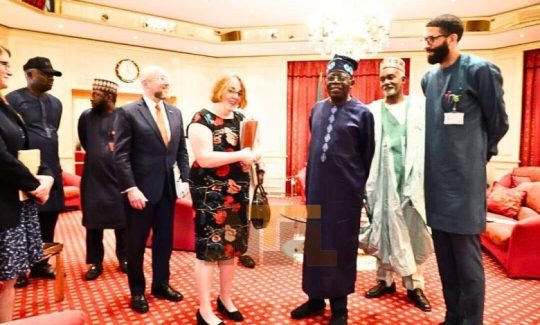
View On WordPress
#Assistant Secretary of State for African Affairs#Bureau of African Affairs#Democracy#Molly Phee#Nigeria#Sahel
0 notes
Text
Let's reaffirm our commitment to the theme of the United Nations International Decade for People of African Descent: recognition, justice, and development.
Every August 31st, the world comes together through the UN International Day for People of African Descent to honor the shared heritage, diverse culture, and profound influence of Africans and the global African diaspora. This day also serves as an opportunity to raise global awareness about the challenges of systemic racism, discrimination, and exclusion faced by individuals of African descent worldwide.
In December 2022, President Biden issued an executive order to create the President’s Advisory Council on African Diaspora Engagement in the United States. In June 2022, I appointed Desirée Cormier Smith as the inaugural Special Representative for Racial Equity and Justice at the State Department. Since then, she has diligently coordinated the Department’s efforts to combat global anti-Black racism and advance the human rights of individuals from marginalized racial, ethnic, and Indigenous communities worldwide through our foreign policy.
On this day, we reaffirm our commitment to the theme of the UN International Decade for People of African Descent: recognition, justice, and development.
STATEMENT BY ANTONY J. BLINKEN, SECRETARY OF STATE ON AUGUST 31, 2023.
#Africa#Bureau of African Affairs#Bureau of Democracy#Human Rights#Diversity and Inclusion#Human Rights and Democracy#Office of Diversity and Inclusion#Office of the Spokesperson#Racial Equity and Justice#The Secretary of State#31 august#international day for people of african descent#statements
0 notes
Text
American Indian Discrimination and Issues
If you want the links to important causes just skip towards the end, but I implore you to read through what I’ve written as it’s important as well!
I think it’s a major disservice that barely anyone talks about the fact that the Federal Government doesn’t recognize members of tribes whose land was taken from them. Obviously most of the US is stolen land but in the mid 1900s the Federal government terminated Indian land rights to “assimilate” Indian people, and without an official land base it’s harder to congregate and act as a sovereign nation, therefore they aren’t eligible for federal recognition. Furthermore, in 1900 the Bureau of Indian Affairs didn’t do a complete consensus of the US and missed places where Indians lived, meaning members of indigenous communities were missed and not represented on the census data. One of the criterion to becoming a federally recognized tribe is the demonstration “that it has been identified as an American Indian entity on a substantially continuous basis since 1900.” (R. Lee Fleming, Director of the Office of Federal Acknowledgement).
Some of you may also be wondering why federal acknowledgement is so important. For starters, American Indians are the poorest ethnic group in the US. Federally recognized tribes are permitted to open up casinos in places that do not permit gambling because these tribes have the status of being a sovereign nation. While these casinos are able to provide for many Indian families and make improvements to reservations, this income isn’t extended to those with tribal ancestry who aren’t apart of those Federally recognized tribes. You also can’t get financial assistance from the Bureau of Indian Affairs if you’re not from a Federally recognized tribe. This means that any federal programs, health insurances, grants, reparations, etc. are not provided.
There is also a large chunk of American Indian history that is erased from the knowledge of the general public - such as the fact that they weren’t granted US citizenship until 1924, 56 years after African Americans were granted it, or the fact they were also subjected to Jim Crow laws and racial segregation in the South, or the Red Power movement as a whole.
I think it’s important to understand the struggles American Indians have faced and still face to this day - having the highest likelihood than any other race of being killed in a police encounter (3x the rate of White Americans, 2.6x the rate of Black Americans), having an incarceration rate 38% higher than the national average and receiving harsher sentences than White, Black, and Hispanic offenders, having the highest rate of violent crime victimizations compared to every other race with around 70% of those committing hate crimes not being of the same race as them, with 46% of the perpetrators being complete strangers to the victim, and 75% of sexual assaults against them being committed by strangers or acquaintances (according to the Bureau of Statistics )- whereas amongst the general population only 58.5% of sexual assaults are committed by strangers or acquaintances (RAINN).
They also have the lowest median household income out of all races in the US (data from 2022). Furthermore, the American Indian population is rarely mentioned in discussions about the racial wage gap despite the fact that they make nearly the same (only one cent more) earnings per dollar as Black Americans do (US Department of Labor) relative to White American earnings and having a lower share of income than every other race. Nor is it mentioned that American Indian women on average are paid less than Black Women (who are often more focused on by the media) when looking at the racial gender gap (National Partnership for Women and Families).
Another issue that is rarely addressed is the poor access and racism faced in terms of health care. The leasing causes of death for American Indians are heart disease (25% of deaths), cancer (22%), and accidents (19%). There are many diseases that affect American Indians at a higher rate than the general population as well. However, they also are more likely to not receive medical assistance because of the cost and much less likely to have visited a dentist as well, putting them more at risk for dental related illnesses. 33% of American Indians also do not have health insurance either. Furthermore, the Indian Health Service (the Federal Department dedicated to providing American Indians with Health Care services) has had its funding cut multiple times within the past two decades (with a $800,000,000 cut in 2013) making it harder to provide adequate health care for them.
I would also like to state that I’m not trying to diminish the discrimination, racism, and pain that other people of color undergo, nor am I trying to devalue or discredit their experiences. All people of color deserve justice and equality . I’m just trying to raise awareness to the fact that American Indians face a lot of discrimination at higher rates but are less focused on in the media. Overall, I just think that it’s important to draw more attention to the issues that they face and different ways to combat those issues.
Some American Indian Organizations and Causes to support are:
The Indigenous Media Freedom Alliance whose goal is to aid American Indians in being seen and heard in independent media. https://imfreedomalliance.org/
C.O.P.E. which aims to help Najavo people who live with chronic illnesses & improve the wellbeing of American Indians. https://www.copeprogram.org/aboutus
Land Back which fights for the return to indigenous lands in the US to their peoples. https://landback.org/
The American Indian Community House which aims to improve American Indian wellbeing and increase the visibility of American Indian cultures in urban settings. https://aich.org/about/
C.H.I.R.P. which originally served to research, preserve, and document the history & culture of the Nevada City Rancheria Nisenan Tribe. However, it now serves as a way to support their people after it was no longer recognized by the Federal government, leaving them without access to programs that support their health and well-being. https://chirpca.org/
Diné C.A.R.E. which defends Najavo communities against exploitative and destructive environmental practices and issues. https://www.dine-care.org/about-us
Hopi Relief Fund which aims to distribute the necessary supplies to aid community members in their recovery of the Covid-19 crisis. https://hopirelief.org/about-us
Indigenous Roots which uses art and activism to promote opportunities for Indigenous peoples, such as local classes, scholarships, artist grants, art installations, etc. https://indigenous-roots.org/
Intertribal Friend House whose mission is to expand resources for American Indians so that they can stay connected to their culture. https://www.ifhurbanrez.org/
The National Urban Family Coalition which advocates to bring awareness to the struggles that American Indians living in urban areas still face. https://www.nuifc.org/
R.J.I.P. which focuses on bringing justice to American Indian victims and addressing the disproportionate rates at which American Indians are victimized. https://www.indigenousjustice.org/
Sogorea Te’ Land Trust which focuses on returning Indigenous Land to indigenous people (similar to Land Back). https://sogoreate-landtrust.org/
N.A.D.L.C. which advocates for American Indians with disabilities. https://www.nativedisabilitylaw.org/
AISES https://www.aises.org/about/history
https://nativephilanthropy.candid.org/timeline/era/indian-self-determination-and-self-governance-era/#timeline-content
I also implore you to also check out these American Indian and Indigenous Businesses:
Cheek Bone Beauty https://www.cheekbonebeauty.com/
Sḵwálwen Botanicals https://skwalwen.com/
Prados Beauty https://pradosbeauty.com/
Ah-Shí Beauty https://www.ahshibeauty.com/
Satya Organic Skincare https://satyaorganics.com/
The Yukon Soaps Company https://yukonsoaps.com/
Blended Girl Cosmetics https://blendedgirl.com/
Sequoia Soaps https://sequoiasoaps.com/
Sister Sky (Haircare) https://sistersky.com/
Quw'utsun Made https://www.firstpickhandmade.com/personnel/quwutsun-made/
Ginew https://ginewusa.com/
B.yellowtail https://byellowtail.com/
Eighth Generation https://eighthgeneration.com/
Lauren Good Day https://laurengoodday.com/
Urban Native Era https://urbannativeera.com/
OXDX Clothing https://www.oxdxclothing.com/
Beyond Buckskin Boutique https://shop.beyondbuckskin.com/
Liandra Swim https://liandraswim.com/en-us
Lesley Hampton https://lesleyhampton.com/
Haus of Dizzy https://hausofdizzy.com/
#american indian#land back#american indian discrimination#racial justice#racial equality#racialdisparities#racial discrimination#indigenous#indigenous rights#american indian rights#indigenous movements#red power movement#indigenous history#american indian history#american indian businesses#indigenous business#indigenous businesses#american indian charities#indigenous charities
4 notes
·
View notes
Text
News from Africa, 19 June
Hage Geingob will host Danish PM Mette Frederiksen and Dutch PM Mark Rutte today in Namibia. Green hydrogen will reportedly be among the subjects discussed.
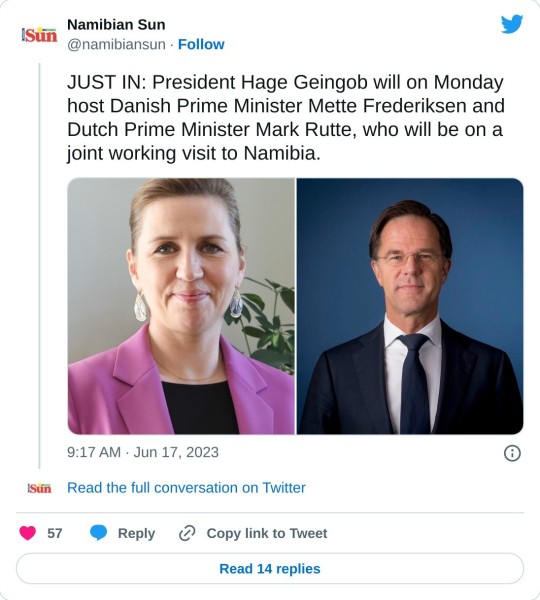
2. Namibia's proposed visa exemption for Chinese nationals is a bilateral agreement that would benefit both countries, according to China's ambassador to Namibia, Zhao Weiping.
Some Namibian politicians have objected to the proposal, with opposition leader McHenry Venaani claiming it is a "hoodwinking process" for Chinese prisoners to come to the country, and aspiring presidential candidate Job Amupanda alleging that it involves a deal between the ruling party and China to garner support for next year's elections.
The proposed agreement's main goal is to attract Chinese tourists and help Namibia become competitive again after the Covid-19 pandemic, according to Namibia's minister of home affairs, immigration, safety and security, Albert Kawana.
3. Angola and Zambia signed a memorandum of understanding to enhance cooperation in information technology, including digital transformation, AI, and space technology.
The agreement includes the establishment of direct cross-border optical fibre backbone connectivity between the two countries, scheduled to happen this month.
The collaboration is expected to help improve the regulation of the Angolan and Zambian telecom markets and lead to improved coverage and quality of ICT services provided in both countries.
4. Namibia is embarking on a journey of digital transformation to modernize various aspects of the country's life.
The Department of Home Affairs, Immigration and Security recently announced the successful implementation of an online passport application system, a major step towards delivering home affairs government services through digital channels. Namibia is partnering with Estonia to bring government services online and gradually prepare citizens for the transformation ahead. The Vice Minister of ICT recognizes the importance of foreign direct investment (FDI) for African technology spaces, but stresses the need for a clear roadmap or strategy to ensure that solutions developed in Africa fit the lifestyle on the continent.
5. Nigeria has 71 million people living in extreme poverty and 133 million people are classified as multidimensionally poor, according to 2023 data from the World Poverty Clock and the National Bureau of Statistics.
6. The Bank of Namibia increased the repo rate to safeguard the dollar-rand peg and contain inflationary pressures, but this will severely impact consumers who rely on debt to survive.
The governor expressed empathy for people losing their homes due to rising debt costs, and urged the nation to find better solutions to keep more Namibians in their homes while maintaining financial stability.
7. The fighting in Sudan has caused a surge in refugees fleeing to South Sudan, exacerbating an already dire humanitarian crisis.
The UN has called for $253 million in funding to respond to the crisis, but donations have been slow to come in.
The lack of resources and funding has led to inadequate food, water, and sanitation facilities in transit camps, resulting in malnutrition, disease, and preventable deaths.
#Dutch PM#Danish PM#visit#Namibia#Green Hydrogen#China#visas#tourists#Angola#Zambia#ICT#network#digital#Nigeria#poverty#clock#currency peg#South Africa#refugees#crisis#food#sanitation#Sudan#Africa
3 notes
·
View notes
Text
While much has been written on China’s media campaigns in the United States, Europe, and Asia, until recently Beijing’s Africa-focused propaganda has received comparably little attention. But it represents a model Beijing is building on to target the global south more broadly. Africa’s 1.48 billion people, set to hit 2.48 billion by 2050, are a critical part of the global community, and China is keen to win them over. Chinese Communist Party (CCP) propaganda emphasizes positive changes in African societies that are attributed, whenever possible, to cooperation with, or learning from, China.
Beijing seeks to build an international coalition of like-minded partners to help further its “core national interests.” While there are various interpretations of this term, all assume three basic overlapping objectives: ensure the CCP will continue to rule China; maintain and defend China’s sovereignty and territorial integrity, as defined by the CCP; and promote a stable international environment conducive to enhancing China’s comprehensive national strength. Beijing is working to develop compelling messaging and strengthen its capacity to reach African audiences, with so far mixed results.
On one hand, Africans generally view China’s presence on the continent favorably. China’s official news agency, Xinhua, has 37 bureaus in Africa, more than any other media agency; and China’s Africa-focused propaganda programs have successfully cultivated dozens of influential African interlocutors who help promote the country’s image and interests. Yet despite spending untold millions of dollars each year on its Africa-focused propaganda work, by some measures China’s favorability still lags behind that of the United States. Moreover, Beijing’s official media outlets have low levels of African viewership, and there is little overlap between the most common themes in their coverage and those in mainstream African media outlets.
Since the CCP’s founding in 1921, it has used propaganda to “educate the masses” and “mobilize friends to strike at enemies.” For non-Chinese—in this case Africans—China’s external propaganda work advances four mutually reinforcing messages: promote a positive view of the CCP and China; promote party policies and Chinese culture; counter hostile foreign forces; and assert and normalize China’s territorial claims over Taiwan, Hong Kong, Tibet, the South China Sea, and other contested areas.
While China has long focused on vanity projects such as stadiums and presidential palaces to court African countries, today Beijing also aims to create what Yang Jiechi, the director of China’s Central Foreign Affairs Commission Office, called “favorable public opinion for the friendship and cooperation between China and Africa.”
Since taking power in 2012, Chinese President Xi Jinping has spoken repeatedly about the need to increase China’s “soft power” by creating a compelling Chinese narrative and strengthening the party’s capacity to convey its political messages overseas. At the 2013 National Conference on Propaganda and Ideological Work, Xi emphasized the “use of innovative outreach methods to tell a good Chinese story and promote China’s views internationally.” In 2014, he introduced a new foreign media–management strategy intended to create “a new type of mainstream media” that would be “powerful, influential, and credible.” Chinese officials understood their marching orders, and worked to enhance the country’s capacity and breadth of propaganda.
Most recently, during his report to the CCP’s 20th National Congress in October 2022, Xi instructed the CCP Central Propaganda Department to “accelerate the development of Chinese discourse and narrative systems, effectively communicate the voice of China, and portray a credible, lovable, and respectable image of China.”
Although official figures are not available for China’s external propaganda expenditures, in 2017 David Shambaugh of George Washington University valued them at about $10 billion per year. Between 2017 and 2020, Freedom House’s Sarah Cook identified “a dramatic expansion in [China’s] efforts to shape media content and narratives around the world, affecting every region and multiple languages.” In 2020, she estimated that China spends “hundreds of millions of dollars a year” on external media propaganda. In 2022, Freedom House estimated Beijing was devoting “billions of dollars a year to its foreign propaganda and censorship efforts.” It’s unclear just what percentage of this is targeted at Africa—but China’s efforts there are extensive.
China’s party-controlled media outlets, sometimes referred to as the Big Four—Xinhua, China Daily, China Radio International (CRI), and the China Global Television Network (CGTN; CCTV International until 2017)—target African audiences in various countries, regions, and linguistic groups. All four receive an unknown amount of vast state resources that allow them to cover a wealth of stories using various types of media (i.e., print, television, radio, and online) in all six U.N. languages—Arabic, English, French, Spanish, Russian, and Chinese—four of which are official languages in at least one African country. They do not identify themselves as CCP-controlled outlets, and each has numerous multilingual, outward-facing social media accounts with millions of followers on platforms that are blocked in China, such as Twitter, Facebook, YouTube, and Instagram.
Within these outlets, the propaganda department’s cadres dominate the editorial process and ensure that stories glorifying CCP leaders receive top billing. Experts identify two types of Chinese staff working at CCP media outlets in African countries: officials from the propaganda department masquerading as journalists, and actual professional journalists. Although the former lack journalism training, they make editorial decisions and oversee both the African and Chinese journalists.
To give its broadcasts an authentic flavor, CGTN headhunts recognizable African TV hosts and reporters and offers them well-paid jobs. After joining a Chinese state-media outlet, however, they learn that investigative journalism is unwelcome if it casts either China or its partners in a negative light. Working in China’s official media means the African journalist must agree not to cover an ever-expanding group of topics deemed “sensitive” by the propaganda department. The editorial line looms over journalists, as one African reporter at China Daily put it: “Within the periphery of the editorial policy, you have every freedom …. Outside the editorial policy, it is impossible to do any story.” An African CGTN journalist concurred: “We know what is acceptable and what is not acceptable. These things will be made clear to you when you join as to what kind of reporting is expected of you and what direction you are expected to take.”
China uses local outlets and influential African voices to disseminate and authenticate its Africa-focused propaganda. Chinese interlocutors build relationships with prominent Africans across various fields, whom the CCP designates as “friends of China.” The objective is to match party-controlled media conglomerates with local content providers to disguise Chinese reports in ways that make them “appear native to the independent publication,” Cook observed in 2020. These “friends” regularly appear on air and provide quotations or write articles for China’s propaganda outlets. In return for pushing Beijing’s propaganda, they may receive material or financial support and, prior to COVID-19, all expenses–paid trips to China.
China also uses business transactions and content-sharing agreements to expand the reach of its Africa-focused propaganda. Some smaller African media houses use Xinhua’s international content, which they obtain via syndication agreements with larger African outlets or state broadcasters. For cash-strapped African outlets, Xinhua’s international reports and images can be an economic lifeline. For Beijing, these outlets’ tight budgets offer an opportunity to amplify and disguise its propaganda beneath a veneer of grassroots legitimacy.
This tactic, known in English as “astroturfing” and in Chinese as “borrowing foreign media” or “borrowing boats to reach the sea,” launders Beijing’s propaganda through either friendly or unwitting foreign media outlets. It has been observed across the global south, from Thailand and Laos in Asia to Peru and Panama in Latin America; and until recently such content had also appeared in some U.S. and European outlets. As of early 2023, news organizations in Egypt, Ghana, Kenya, Nigeria, South Africa, Zambia, and Zimbabwe are among those that have signed media cooperation and content-sharing agreements with Xinhua.
China’s firms have also used equity investments to enhance their influence over independent African publications. In 2013, for instance, China’s StarTimes acquired a majority stake in the South African satellite TV company TopTV. The firm’s partnership with TopStar, a Zambian state broadcaster, allowed it to obtain licenses for signal distribution and content provision. The China-Africa Development Fund and the state-owned China International Television Corporation own a 20 percent stake in South Africa’s Independent Online (IOL), which has become the official media partner of China’s embassy in South Africa. In 2018, IOL columnist Azad Essa was fired after he criticized China’s persecution of Muslims in his column.
Training African media is another powerful tool. In the 2018–21 Forum on China-Africa Cooperation Beijing Action Plan, China agreed “to hold training and capacity building seminars for African countries’ media officials and journalists, promote more exchanges and mutual visits between Chinese and African media personnel and support more exchange of correspondents by media houses.” The purpose of media exchanges and trainings is to foster more cooperation “in media operations, program production, technical services and personnel training.”
China also underwrites private bilateral and multilateral training sessions for African journalists and editors. These working-level seminars provide the optimal environment for building relationships. After being feted in China, many attendees naturally feel reluctant to produce content that impugns their generous hosts when they return home.
Before COVID-19, China’s rapid expansion of sponsored exchanges, syndication agreements, and media training programs for African journalists suggested it believed its outreach was working. By 2017, CRI had secured content sharing agreements with at least 70 overseas radio stations and 18 global internet providers. Indeed, dozens of African media professionals do republish or share China’s propaganda content. These cheerleaders legitimize the party’s rule over China, advance Beijing’s claims to lead the global south, deflect criticism of China and its African partners, perpetuate anti-United States narratives, and question the effectiveness of liberal democracy. As China’s African “friends” gain resources and influence, the predictable result is media in countries such as Kenya, Ghana, and Malawi are reprinting increasing amounts of Xinhua content—even as concerns about China’s intentions continue to mount in Western capitals.
Still, the reach of China’s propaganda in Africa should not be overstated. After analyzing China’s influence on media coverage in 30 African countries in the first half of 2020, scholar Dani Madrid-Morales concluded that Chinese sources appeared to be much less influential than French or British outlets, but more influential than U.S. media.
One reason may be their small audience size. In 2021, roughly 2 percent of Kenyans and South Africans listened to CRI or read China Daily, and about 7 percent of Kenyans and 6 percent of South Africans watched CGTN. (Not surprisingly, Madrid-Morales and Herman Wasserman found those who consumed Chinese media tended to hold more positive views of China.) This limited reach may help explain the decline in favorable opinions of China in these two countries between 2013 and 2019—from 78 percent to 58 percent in Kenya and from 48 percent to 46 percent in South Africa, according to the Pew Research Center—even before the pandemic impacted China’s global image. During the same time, the percentage of Nigerians holding favorable views of China fell from 76 percent to 70 percent.
As officials in a liberal democratic nation, U.S. policymakers cannot set a strict editorial line and enforce it by suppressing critical African voices. They have neither the bureaucratic apparatus nor the inclination to compete head-to-head with CCP propagandists. Instead, consistent with U.S. traditions and values, Washington should help support independent African journalism that holds governments and leaders accountable.
Yet, despite widespread recognition that long-term strategic competition with Beijing is unavoidable, the U.S. government has yet to overtly contest China’s anti-United States propaganda in Africa. The primary reason for this appears to be Washington’s long-standing bipartisan neglect of Africa. Instead of continuing with this laissez-faire approach, the United States should actively thwart CCP propaganda that wrongfully disparages it.
It can do so in various ways. For instance, Voice of America can adopt a well-resourced and coordinated “go where the people are” strategy that reflects emerging demographic trends and the ongoing transition to social media apps and streaming platforms. And U.S. entities such as the National Endowment for Democracy can work with local partners, such as independent fact-checking organization Africa Check, to identify false or misleading reports and shine a spotlight when Chinese officials or their African collaborators suppress critical reporting.
Additionally, to encourage African outlets to find alternatives to Chinese propaganda, U.S. news agencies such as the Associated Press and Bloomberg could cut the costs of their feeds for African media outlets, and the U.S. government can offer those agencies subsidies instead. Washington could also underwrite both short-term and degree-granting journalism training programs to help African media professionals develop the techniques and professional connections they need to resist China’s inducements and intimidation.
The same conditions that have precipitated China’s investments in the African media sector—the continent’s youthfulness and its growing population—should also be attractive to the United States. Despite decades of neglect and China’s best efforts, Africans in many countries continue to hold favorable views of the United States. By investing in objective, high-quality local reporting and juxtaposing this grassroots approach with China’s heavy-handed censorship, the United States can offer an alternative to China’s propaganda on the continent.
6 notes
·
View notes
Text
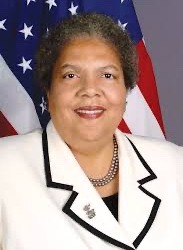
Ruth A. Davis (born May 28, 1943) is a US diplomat. She is the 24th Director-General of the US Foreign Service. She is the first woman of color to be appointed as Director-General of the Foreign Service and the first African-American Director of the Foreign Service Institute. She became a career member of the Senior Foreign Service and a Career Ambassador. She is the Chief of Staff of the Africa Bureau of the US Department of State.
She graduated magna cum laude from Spelman College and received her MA from UC Berkeley. As a Merrill Scholar at Spelman, she studied abroad in Europe and the Middle East.
She was appointed by President George W. Bush to the post of Director-General of the Foreign Service. She served at the Foreign Service Institute.
She has served as the Principal Deputy Director Assistant Secretary for Consular Affairs, Consul General in Spain, and was the Ambassador to Benin. She served as a Distinguished Advisor at the Ralph Bunche International Affairs Center at Howard University. She joined the Foreign Service as a Consular Officer in Zaire, she went on to serve in consular affairs in Nairobi, Tokyo, and Naples. She returned to the US as a Pearson Fellow in DC. #africanhistory365 #africanexcellence
1 note
·
View note
Text
What Is The Best Background Check?
For example, if a person applies for a position as a driver, but was beforehand arrested for driving underneath the affect and in consequence has a criminal record, they can be disqualified from the position. But if the person is making use of for a job as say, an admin clerk, the drunk driving conviction could be irrelevant. Consequently, a criminal record check can only be accomplished if it is pertinent to the job for which you are hiring. Employers ought to employ dependable background check strategies for nannies and housekeepers.
From probably the most regularly used criminal credit score, ID - and qualification checks, to extra industry-specific checks for FAIS compliance, Lexis RefCheck has got you lined. Choose the background check s you want beneath by including them to your purchasing cart, then proceed to the checkout to pay together with your debit or bank card, or to finish an EFT payment. Results are sometimes available on the same enterprise day, with just a few taking up to forty eight hours to finish. Moreso, the Department of Home Affairs now requires an employment background check to be done for any software carried out for permanent residency primarily based on exceptional abilities – ie – an application in terms of part 27(b) of the Immigration Act. Background screening (also often recognized as Background checks) is the process of checking and verifying various items of personal and confidential data on a person or organisation.
It solely takes a few minutes of your time to make sure that you're dealing with somebody who honours their dedication to pay back what they owe. Background screening, pre-employment checks, vetting and personal due diligence basically result in one thing…safe hiring and employment decisions. For users who reside within the US, we don’t always check all state and county courthouse records, criminal registries, and public databases, such as but not limited to Moving Violation Reports and Driving Records.
There is also a serious must conduct an prolonged due diligence on any South African firm which you might be contemplating doing enterprise with. Our investigations into companies symbolize 10s of tens of millions of US Dollars each month - cash which is commonly in danger of being defrauded. South African workers are literally 'hunted' around the world because of their nicely deserved status for onerous work ethic, their sociability, honesty and barely old world charm. At iCatch we try to supply distinctive service and exceed ourselves as probably the greatest private investigator firms in Cape Town. Every particular person is entitled to 1 free credit score check from the credit bureaus annually.
The group offers a diverse vary of events, together with legal seminars, member forums, roundtable discussions, and an annual conference, every designed to deal with specific elements pertinent to background screening in South Africa. SABSA presents an array of skilled improvement packages, comprehensive coaching workshops, and related certifications designed particularly for background screeners. Our primary objective is to supply distinctive educational sources that assist steady learning and progress within the trade. See the results of background checks and generate standardized reviews for stakeholders.
CREDIT CHECKSThe National Credit Regulator (NCR) allows firms to conduct credit score checks on people if they are making use of for a related financial place. Criminal Record Checks, principally used for employment functions, are carried out by way of the Automated Fingerprint Identification Service (AFIS) in South Africa. In the occasion that the candidate has no criminal record, a report indicating “no illicit exercise identified” is returned.
Considering the country’s high crime price and low conviction fee, criminal record checks alone might not offer a comprehensive insight into an applicant’s background. This necessitates a combination of a number of background check strategies, together with verification of employment historical past, educational degrees, and extra. Negligence in the hiring process can result in a cascade of problems that extend far past the preliminary recruitment phase.
Background checks reduce a company’s risk for reputational harm and criminal actions similar to fraud and theft. The biggest background checking and vetting business in Southern Africa is identified as MIE – who additionally happens to be one of many preferred employment verification checks that the Department of Home Affairs requests utilisation from. Due to an increase in CV fraud, background checks have grown in reputation in South Africa in recent times. Background checks are more and more a must for corporations doing business in South Africa to have the ability to minimise danger and safeguard their reputations and personnel. Through MIE, we provide all kinds of background checks that can be conducted on people both in Southern Africa and internationally.
A complete background check may help make sure that potential employees are reliable and suited to the job, reducing turnover and maintaining workplace consistency. During a criminal background check the private investigator will conduct a criminal check investigation into the topic so as to verify if the subject was or has been concerned in criminal issues. A criminal background check might help you make the right decision when hiring a model new employee or doing enterprise with a person the place large amounts of cash is concerned or perhaps your new life companion. For example, an employer may require annual or semi-annual employment drug testing or criminal background checks for their workers to make sure a safe and secure work environment.
employee background check are additionally readily available to assist by offering accurate, complete, and current details about opportunities to review at accredited postsecondary establishments. You will usually need to provide a set of fingerprints, a duplicate of your identification document (ID), and any further paperwork requested by SAPS. “You may also wish to return via older posts and images and delete anything potential employers or current bosses might discover objectionable,” it said. Employers like to take a glance at Facebook, Twitter, and different social networks to study extra about what their candidates are like in actual life. However, findings on these fronts are sometimes misleading, out of context, and primarily based on assumptions.
#background check#identity verification#how do employers check qualifications#criminal record verifications#employee background check
0 notes
Text
On This Day in Women’s History
April 11th
1908 - Jane Bolin, the first African-American woman to graduate from Yale Law School is born
1910 - Annie Dodge Wauneka, who worked on the tuberculosis epidemic using Navajo and the Bureau of Indian Affairs ideas and awarded the Presidential Medal of Freedom is born
Source
1 note
·
View note
Text
Last night was weird....these people came up to where I sleep and started stalking me for wallet information like my name etc.....and started being persistent after no....so I was like you came up at me where I sleep and the students know that's not correct....to do....
So they apparently take part in sleep deprivation studies and people who stalk my sleep are people I then guess the very worst of
I don't ever want any creep school genocide pharmaceutical rep stalking my life with nurse sex offender and mission no get away from me
Uhm I just thought to myself they kept rapeing the student homo sexual ass issue in some way and a sheriff won't be afraid of them and will clear out the begger insides to jails for trapping prostitution in situations that gang rape them and you just stalk around homeless to try to lock us up and I don't take any type of profit or any personal gain or bribe off systems so Nazi I'm told they slaughter migrant children so
So they have to go to jails and shelters for being creepy incompetent begger jobs and they only stalk around to try to fill their sentencing with homeless and get away with it....
So now I have to tell security molestives came around telling me their what help is and I've told them numerous times criminals may have visitations but eventually they have to use their own foundations not have nasty parties and their foundation will have to be directed and live under the dominance and direction of someone who is white privilege....instead of feeling cultural dominance over me
You can't come around me being fuck stupid without a commie finally putting you away for subversion of inherent purpose and meaning of situations
That's me with the creepy homeless exhibit at the Earl and birdie library....those people are for negro foundations not homeless those aren't homeless indigenous problems those are very traditional negro foundation problems
If it's the black men in the exhibit they are for very obvious structure jobs not getting done in San Diego and people took your structure that's not at all the same problem though
Its Martins day and I don't care what has been between us all it's Martins day and Martin is right
Criminology also is not homelessness....people with a criminology have to take their own foundation veterans also....
I have been homeless for like seven years.....so people like me do want to be a philanthropist like stories of African slaves
Money for me is a positive thing people with documented trade may live a peaceable common wealth the way other trades also do.....so I do want money though
Its a different belief system entirely in existential imperative....
People like me are a homeless person and I will do things to keep ending the bloc in my life I don't experience myself displaced from it the way their negro exhibit explains
People like me do like migration and experience myself displaced from new ideas and organizations and new ways to experience being alive
Well some homelessness does have native status so people like me more wab kinew is a poverty example of this
So people like me try to figure out how to approach the bureau of Indian affairs about aquired genetics iw the white though inherently is suppose to diversify it's genetic profile or die of cancer......about what historically indigenous leaders would give....younger sister.....that one oh yea the white one
People like me look at Navajo germantown weavings and am told if sick the papers didn't report specific attacks on homeless dwellings like burning calupa round huts that to me is a current catastrophe the house I try to care about naval health and it's just still that focus so
That's me if people ruin housing for migrant capabilities it actually makes me feel a lot happier and that's me about tongva and control burns
Things like just leaving pacific beach this nasty terrorized crime ridden rental area of a bad it could be like Paris corporate greed scam having to see it all just go if Harriet Tubman looked into death reek...
That's not kind when there are very sick sick COVID houses around and they could slowly separate and pacify the neighbors
Harriet Tubman s bad bitches a drunks guide to black history....i would be one
Its Martins day and Martin is correct this is a time of Affluence and the pale peoples films to me would be way better country Camden Arkansas there is just no reason to me to see this many people trapped here when there is like a reserve for this type of activity
I'm sorry but you all have reservations to dine at select land country homes
0 notes
Text
U.S. Delegation Enhances Ties at Africa Cup
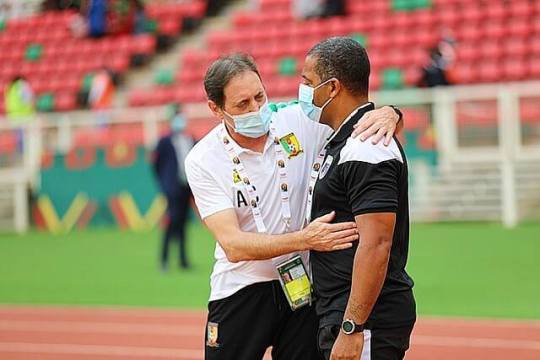
Strengthening People-to-People Connections Through Sports
In an exciting development, the President’s Advisory Council on African Diaspora Engagement in the United States (PAC-ADE) announced a significant delegation to the 2024 Africa Cup of Nations in Côte d'Ivoire.
This move, under the leadership of the U.S. Department of State and in collaboration with the Global Engagement Center (GEC) and the Bureau of Educational and Cultural Affairs (ECA), aims to fortify cultural and economic ties between African communities, the global African diaspora, and the United States.
Moreover, this initiative represents a concerted effort to bridge cultural divides and strengthen international relationships through the universal language of sports.
Sports Envoys and U.S. Officials Lead the Way
The delegation, featuring prominent sports envoys and U.S. officials, is set to travel to Abidjan, Cote d’Ivoire, on January 11 for Africa’s largest sporting event. The group includes renowned figures such as Chinenye Ogwumike, a two-time WNBA All-Star and ESPN host; Lisa Leslie, a four-time Olympic gold medalist and Basketball Hall of Famer; and Crystal Dunn, a star of the U.S. Women’s National Soccer Team.
Promoting U.S. Investments and Strengthening Ties
The delegation's journey harnesses the strength of the African diaspora, showcasing U.S. investments in Côte d’Ivoire. Furthermore, it serves as a platform to reinforce cultural and economic connections, leveraging the unifying power of sports. Additionally, the team will engage with government officials, international partners, civil society, and Ivorian youth, thereby emphasizing the importance of sports in forging strong ties.
PAC-ADE’s Role in U.S.-Africa Relations
Guiding U.S. Engagement with Africa
Announced by President Biden and Secretary Blinken in September 2023, PAC-ADE plays a pivotal role in reinforcing cultural, social, political, and economic ties between the United States and Africa. Moreover, the council promotes trade, investment, and educational exchanges, offering invaluable guidance in shaping the U.S.'s relationship with African nations.
Celebrating African Sporting Excellence
The United States extends its best wishes to the 24 teams competing in the Africa Cup of Nations championship. This event not only celebrates Africa’s sporting excellence but also presents an opportunity for deeper engagement and understanding between the U.S. and African countries.
In Conclusion
The U.S. delegation’s presence at the Africa Cup of Nations 2024 represents a strategic and heartfelt effort to strengthen people-to-people ties through the power of sports. Importantly, by bringing together prominent sports figures and U.S. officials, the delegation aims to create lasting cultural and economic partnerships.
Consequently, this initiative showcases the shared values and aspirations of the U.S. and African nations, fostering a deeper understanding and collaboration.
Sources: THX News & US Department of State.
Read the full article
#AfricaCupofNations2024#AfricanSportingEvents#GlobalAfricanDiasporaEngagement#InternationalSportsEnvoys#PAC-ADE'sAfricanDiasporaRole#President’sAdvisoryCouncilonAfricanDiaspora#SportsDiplomacyandEngagement#U.S.DelegationinCôted'Ivoire#U.S.DepartmentofStateInitiative#U.S.-AfricaCulturalTies
0 notes
Text
By • Olalekan Fagbade
Gabon;, several Generals, 1,000 soldiers compulsorily retired as coup fear spread across Africa
In a move suspected to be repressive against the growing spate of military coup in the African continent, the African Union’s Peace and Security Council on Thursday suspended Gabon following the Wednesday overthrow of President Ondimba Ali Bongo by soldiers led by the head of the Republican guards, Gen Brice Nguema.
According to The PUNCH, the continental body in a post on X, formerly Twitter, condemned the military takeover of power in the Central African country.
This came as Rwanda and Cameroon hurriedly retired 1, 029 senior officers in a surprise move against their respective militaries.
The Rwandan authorities approved the retirement of 12 generals, including two four-star generals, James Kabarebe and Fred Ibingira, two three-star generals, Charles Kayonga and Frank Mushyo Kamanzi, and several officers.
According to a Rwandan national newspaper, News Times, the government approved the retirement of 12 generals and many officers. The publication stated that the retirements were announced on Wednesday, in a statement issued by Rwanda Defence Force.
Among those retired are two four-star generals, James Kabarebe and Fred Ibingira, two three-star generals, Charles Kayonga and Frank Mushyo Kamanzi.
Kabarebe and Kayonga have previously served as Chief of Defence Staff of RDF, while the other two have been service chiefs previously
The statement partly reads, “The President has also approved the retirement of 83 senior officers, six junior officers and 86 senior non-commissioned officers, 678 whose contracts ended and 160 medical discharges.”
In Cameroon, President Paul Biya has also reshuffled the military with new appointments to the Controle Generale des Armees.
The new controllers are Capt Ajeagah Njei Félix Colonel and Colonel Nguema Ondo Bertin Bourger.
Appointments were also made to the positions of Technical Advisers, Bureau Commissariat, and Air Force Technical Inspector.
Disclosing its decision after a meeting of its Peace and Security Council, the AU said it “decides to immediately suspend the participation of Gabon in all activities of the AU, its organs and institutions.”
It said the meeting was chaired by the AU commissioner for political affairs, Bankole Adeoye of Nigeria, and the current holder of the council’s rotating chair, Burundi’s Willy Nyamitwe.
Nguema for inauguration
In a new development, the junta in Gabon has said Gen Nguema will be sworn in on Monday as the transitional president as the opposition called for its candidate to be recognised as the winner of weekend elections.
The military in a statement on Thursday sought to reassure international donors they would “respect all commitments” at home and abroad and “phase in” transitional institutions.
The spokesman for the new regime, Col Ulrich Manfoumbi, said on state television that the swearing-in of Nguema would take place at the constitutional court.
Gabon’s opposition Alternance 2023 alliance had remained silent since the coup, but on Thursday called on the military leaders to acknowledge its victory in the election.
The alliance “invited the defence and security forces to the discussion so as to work out the best solution,” following the vote.
Led by university professor Albert Ondo Ossa, Alternance had earlier accused President Ali Bongo of “fraud” and demanded he hand over power “without bloodshed”.
Ossa claimed the Bongo clan remained in control and there had not been a coup but a “palace revolution”. “Oligui Nguema is Ali Bongo’s cousin,” he told France’s TV5 Monde.
He stated, “The Bongos found that Ali Bongo had to be put aside to be able to properly pursue the Bongo system. Oligui Nguema is an underling. Behind him, it’s the Bongo clan keeping hold of power,” he said, urging international help to restore order.
#1000Soldersretired #Africa #coup #Generals
0 notes
Text
World: Antony Blinken Gets Muted Greeting As He Arrives in China
— By Khaleda Rahman | June 18, 2023
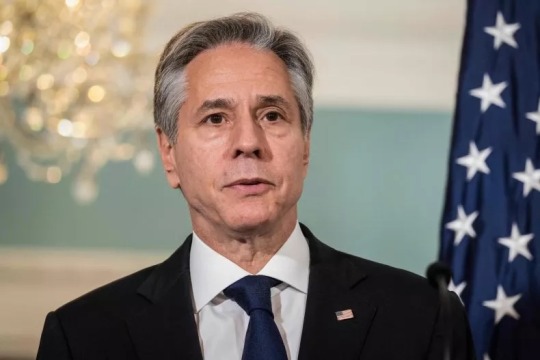
US Secretary of State Anthony Blinken speaks at the U.S. Department of State in Washington, D.C., on June 16, 2023. Blinken received a muted welcome when he arrived in China for diplomatic talks Sunday. Jim Warson/AFP Via Getty Images
U.S. Secretary of State Antony Blinken received a muted greeting as he arrived in China on Sunday to kick off high-stakes diplomatic talks.
He was welcomed by Yang Tao, Director General of the Department of North American and Oceanian Affairs of the Foreign Ministry, and U.S. Ambassador to China, Nicholas Burns, as he landed in Beijing.
Blinken is the first top U.S. diplomat to visit China in five years, continuing frosty U.S.-China relations. A February trip was postponed following the diplomatic tumult sparked by what the U.S. said was a Chinese spy balloon flying over American airspace.
Photos and videos showed there was no red carpet to welcome Blinken, and only a small number of officials had gathered at the airport.
Human rights activist Jennifer Zeng, who has lived in the U.S. for the past 12 years, noted in a tweet that "only the U.S. ambassador and Yang Tao, the director of the North America and Oceania Department of the Chinese Ministry of Foreign Affairs (a much lower level #CCP official) were present to welcome him at the airport. No red carpet. No welcoming crowds, no waist drum performance… This, according to Chinese standards and culture, is a deliberate humiliation."
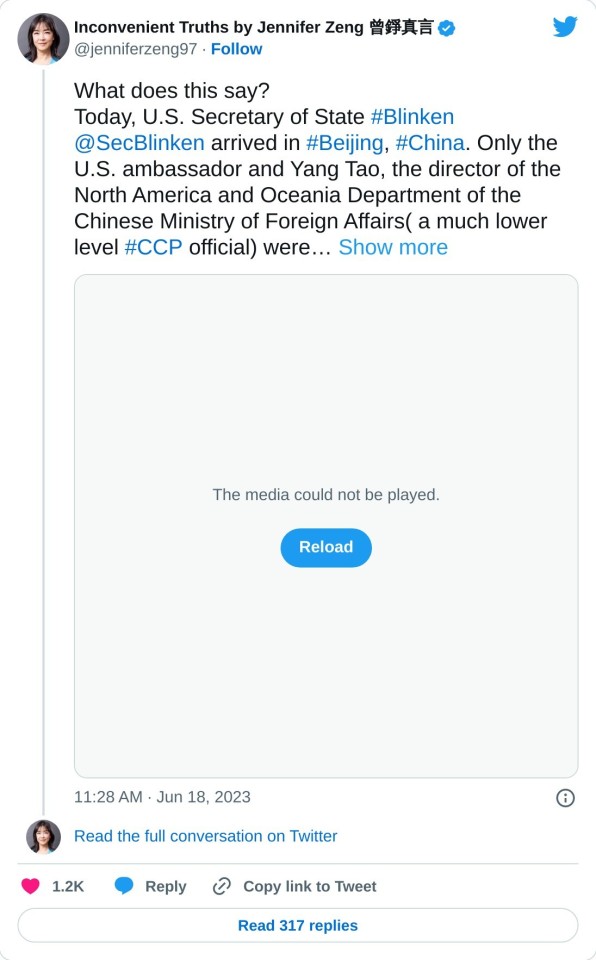
Professor Steve Tsang, Director of the China Institute at the School of Oriental and African Studies in London, U.K., told Newsweek that Blinken's visit is viewed by Beijing as a concession to the U.S.
Blinken "is trying to re-open high-level dialogue and set up some kind of guardrails to reduce risk for US-China relations to slide further," Tsang said.
"Beijing essentially thinks that the USA is at fault and unless the U.S. side shows 'sincerity' and retracts from its hostile approach to China, there's not much to talk about.
"So, the very fact that the visit is taking place is already being seen by Beijing as a concession it has made to the U.S. Unless Blinken has something to offer Beijing that Beijing sees as valuable (thus showing sincerity on the part of the U.S.), the visit is unlikely to secure concrete results."
Twitters users quickly compared the lack of fanfare for Blinken's arrival to the grand welcome received by French President Emmanuel Macron when he arrived in China for a state visit in April.
China rolled out the red carpet for Macron, with China's top diplomat Wang Yi greeting him at the airport. A Chinese guard of honor and children were also part of Macron's welcome.
"No red carpet, no greeting party," wrote Zhao DaShuai,, who in her Twitter bio claims to be an employee of the People's Armed Police Propaganda Bureau.
"But it's still, it better than Ursula von der Leyen having to get off from a commercial terminal. Let's see if he's important enough to meet President Xi [Jinping] like Bill Gates just did."
Although Twitter is officially blocked in China, some Chinese companies and national media, such as Huawei and CCTV, use the service through a government-approved VPN. Many government departments and officials have their own accounts.
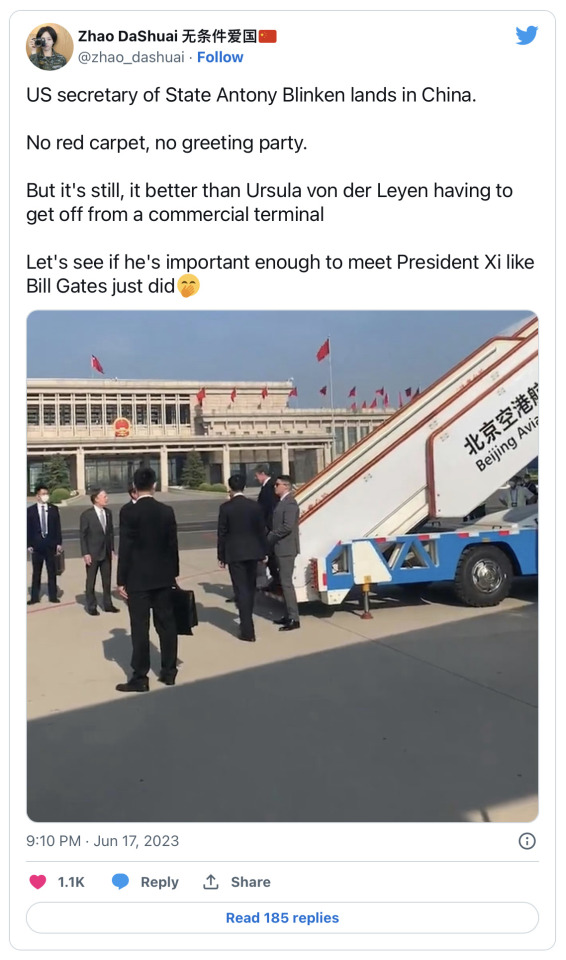
Another Twitter user shared video of Blinken's arrival, writing: "No red carpet. No high ranking officials to meet him. Just a red line to cross."
However, some said the two visits should not be compared.
"Blinken is a cabinet level official on a work visit, while Macron is the head of state on a state visit," a Twitter user noted.
Former President Donald Trump also received a lavish welcoming ceremony when he arrived in Beijing for a state visit in 2017. He descended from a red-carpeted staircase to uniformed guards and children waving U.S. and China flags.
Blinken began his visit by meeting Chinese Foreign Minister Qin Gang for an extended discussion, The Associated Press reported.
He will hold further talks with Qin as well as Wang, China's top diplomat, on Monday, and possibly meet President Xi.
Asked if Blinken could ease tensions with China on his trip, President Joe Biden told reporters on Saturday: "Sure. Well, look, China has some legitimate difficulties unrelating to the—unrelated to the United States. And I think one of the things that that balloon caused was not so much that it got shot down, but I don't think the leadership knew where it was and knew what was in it and knew what was going on. I think it was more embarrassing than it was intentional.
"And so, I'm hoping that, over the next several months, I'll be meeting with Xi again and talking about legitimate differences we have but also how there's areas we can get along."
0 notes
Text
LGBTQ Travelers Venture to Places Where Being Gay Is Illegal
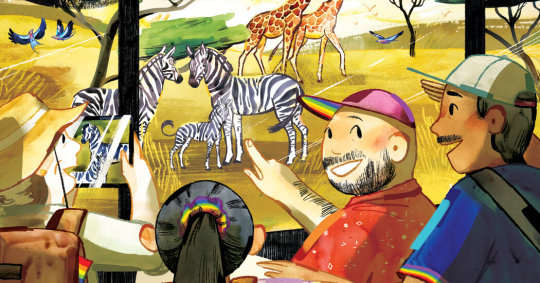
A romantic island getaway in the Maldives. A safari in Kenya. A visit to the pyramids in Egypt.
Apart from being popular on bucket lists, these vacations have one thing in common: Their destinations have strict anti-L.G.B.T.Q. legislation. In the Maldives, gay sex may be punished with lashes and up to eight years in prison. In Kenya, it can bring a sentence of up to 14 years. And in Egypt, the authorities are known to throw people in jail for simply waving a rainbow flag.
Paradoxically, these trips are also all offered by travel companies founded by and catering to members of the L.G.B.T.Q. community. In interviews, the founders of four of these companies, which take a combined total of 3,000 tourists — most of them American — abroad each year, said they were providing a safe way to meet a growing demand for trips to countries that criminalize L.B.G.T.Q. people.
“I’m gay and I want to visit these places,” said Darren Burn, the founder of Out of Office, an inclusive luxury travel company. “And if I want to visit these places, then there are other gay people who do, too. So if we can enable them to do it in a fun, exciting and safe way, then that’s exactly what we’re here for.”
A world that isn’t always friendly
By some metrics, certain L.G.B.T.Q. Americans have it easier when it comes to planning their next trip. Same-sex couples tend to have more disposable income because they are less likely to have children and more likely to both be employed, according to census data. Married gay men have the most spending power, with a median household income that is more than $25,000 higher than their straight and lesbian counterparts.
Even so, being out and getting out can be at odds in a world where many places are hostile — and sometimes outright dangerous.
“There is no place on earth where you can be 100 percent safe while being L.G.B.T.Q., at least while expressing it,” said Lucas Ramón Mendos, a lawyer and the research coordinator at ILGA World, an L.G.B.T.Q. human rights group. “What we can say for certain is that where there is a legal framework that strictly, explicitly criminalizes certain expressions, the likelihood of getting into trouble is a lot higher.”
According to ILGA World maps that track the world’s sexual orientation laws, there are still more than 60 countries that criminalize consensual same-sex relations. Punishments range from incarceration to the death penalty. Uganda notably just enacted a law calling for life in prison for anyone convicted of having gay sex, and in some cases even death.
Scratching those countries off the list of possible destinations shrinks the globe dramatically: parts of Asia, more than half of African countries, and practically the entire Middle East — with the exceptions of Israel and Jordan — become off-limits. (And that’s not even taking into account countries like China and Russia that target L.G.B.T.Q. people indirectly, by censoring speech, for example.)
Yet L.G.B.T.Q. travel companies frequently visit such places.
“I’ve never had an issue. I haven’t heard of anyone having issues,” said Bryan Herb, co-founder of Zoom Vacations, which operates small tours in countries such as Kenya, the Maldives, and Morocco, all places where gay sex can bring prison terms. “There’s no there there.”
Safer for some than for others
While U.S. diplomatic missions help Americans who get in trouble abroad, Angela Kerwin, a senior official at the Bureau of Consular Affairs, said they do not collect data in a way that would allow them to track cases involving L.G.B.T.Q. travelers specifically.
“The laws that criminalize L.G.B.T.Q. status or conduct around the world are more often than not used to target and punish people from the country in question,” said Jessica Stern, the U.S. special envoy to advance the human rights of L.G.B.T.Q.I.+ persons. “That’s not to say that L.G.B.T.Q. Americans and their families aren’t at risk when they travel, but we are not the primary targets of those laws.” (For Americans who also carry a passport from the country they’re visiting, this guidance might not be as straightforward, Ms. Kerwin said. They might be treated as citizens by the local authorities.)
None of the four travel company founders reported any clients who’d had legal run-ins, though some mentioned minor brushes with locals. Their clientele tends to be older and male, with transgender travelers a rarity.
Safety concerns can be especially daunting for transgender people headed abroad. They already face hurdles to updating travel documents and are more likely to live in poverty than other L.G.B.T.Q. people.
“I have recently had a flight canceled and they were rerouting me through a very hostile country for L.G.B.T.Q. folks, and I was going to be laid over there for nine hours,” said Jay Brown, a senior executive for the Human Rights Campaign, who is transgender. He asked not to name the country for fear it could hurt working relationships with advocates in the region. “If I had a health care emergency in that country, I don’t know what would happen to me,” he said.
Mr. Brown ended up taking three trains and three flights in 26 hours to avoid the layover. “I ran from gate to gate at every airport, and ran from train to train,” he said. “My bag, of course, was not at my destination.”
Most countries that criminalize same-sex relations lack a legal and regulatory framework when it comes to gender transition.
“I wouldn’t say that because these laws target only homosexual acts, that transgender people are safe,” said Mr. Mendos. “It’s exactly the opposite, actually.”
Pink money in a gray zone
Many countries may just depend on the influx of tourist dollars so much that they’re willing to give tourists — whether straight or gay — special treatment.
The tourism industry is a top contributor to Kenya’s gross domestic product and accounts for more than half a million jobs in Morocco. Hospitality also drives the economy in the Maldives, where three local men recently received prison sentences for having homosexual relations, while dozens more have been investigated.
“In every country on earth, the law doesn’t necessarily match the reality,” said Mr. Burn, whose company offers package deals for symbolic same-sex marriages and honeymoons in the Maldives, which start at around $5,000 per person. “You know, it’s illegal to drink alcohol in the Maldives, but you go to every resort and you can drink alcohol.”
It’s in that gray zone that L.G.B.T.Q. travel companies operate. Yet when they’re lining up suppliers and hiring local workers, they are anything but ambiguous.
Robert Driscoll, who has run the small-tour operator Venture Out since 1998, said that to avoid unpleasant surprises, it was important to be “clear with suppliers about what the nature of the group is and making sure that they’re OK with it.”
He said that years ago, when he first started taking gay Americans abroad, it wasn’t uncommon for his inquiries to suppliers to go unanswered. Now, he receives emails daily courting his business, some from unexpected places.
“We would love the opportunity to work with your organization to create tailored itineraries for your LGBTQ+ travelers in Tanzania,” read a recent email he received from a small safari operator.
Under a colonial-era law, Tanzania punishes consensual gay sex with up to life in prison, and in April, the government shut down thousands of websites and social media accounts linked to gay groups and people. Neighboring Kenya, also a popular safari destination, has recently experienced a rise in anti-L.G.B.T.Q. violence.
Safaris are among the most expensive trips L.G.B.T.Q. travel companies offer, with prices running into the five digits. Mr. Driscoll, who has led many groups to watch wildlife in Africa, said he recently had a same-sex couple cancel their trip to Tanzania after reading a travel advisory on the State Department website warning travelers about “targeting of L.G.B.T.I. persons.”
The Tanzania Tourist Board, as well as the tourism agencies of the other countries discussed in this article, did not reply to requests for comment.
Weighing the risks and ethics
Ms. Kerwin of the Bureau of Consular Affairs said prospective travelers should go beyond the State Department travel advisories and read the agency’s yearly human rights report, which includes detailed information on the situation of L.G.B.T.Q. rights for each country.
“Never can you cover every eventuality,” she said. “But if you’re informed, then you can make a decision as to whether or not you actually want to travel to that country.”
“Any legal and safety information we provide to clients before they pay us a deposit,” said Robert Sharp, a co-founder of Out Adventures, a small-tour operator based in Canada that serves a largely American clientele. “It is our moral and legal obligation to allow them to decide if it is right for them.”
All travel companies surveyed for this article strongly recommend that clients take out travel insurance, and some even require it. Out of Office and Out Adventures also offer 24-hour hotlines to respond to clients’ questions and emergencies.
Yet travel companies are not legal firms, and they say that the best they can do is give travelers enough information to make an informed decision. Out Adventures clearly states the laws and limitations of each destination on its website. When traveling to Tanzania, for example, clients are advised to practice discretion since “even heterosexual PDAs are frowned upon,” referring to public displays of affection.
The page for Out Adventures’ tour to Egypt, including a Nile River cruise and snorkeling in the Red Sea starting at $5,495 per traveler, explains that “gay dating apps should be avoided” and discourages clients from trying to participate in the “underground gay scene” of the larger cities.
The Egyptian authorities have been reported to harass and entrap members of the L.G.B.T.Q. community on social media and torture those in custody.
“Not only do we want to protect the group,” Mr. Sharp said, “but we don’t want to put anyone in the local queer community in a situation where they could be at risk because they’re seen with this group of obvious homosexuals.”
Gurchaten Sandhu, ILGA World’s director of programs, warned of the dangers of “advocacy tourism,” where travelers get involved in activism at their destination, possibly jeopardizing not only themselves but also those they leave behind when their vacation is over.
Calling for travelers to boycott a country could also have unexpected adverse outcomes, Mr. Mendos of ILGA World and others cautioned.
While the impulse often stems a desire to help, Ms. Stern said, pushing for this kind of action without making sure L.G.B.T.Q. rights groups in the country stand behind it could lead to a backlash against local L.G.B.T.Q. people and “do more harm than good.”
Choosing to visit, on the other hand — even if you can’t be as out as you might want to be — may still have a positive impact on L.B.G.T.Q. people’s lives, at least indirectly.
“The travel industry in country after country is often one of the places where L.G.B.T.Q. people seek out jobs and find employment because there is heightened tolerance,” Ms. Stern said.
Quietly promoting change
There is no shortage of companies to pick from when planning a vacation to countries like Kenya, Egypt or the Maldives, but L.G.B.T.Q. travel providers say what sets them apart from mainstream options is not only that they make their clients feel welcome and safe, but also that they direct their resources to handpicked, queer-friendly businesses.
“We are putting money in the pockets of more progressive-thinking people and organizations that in the long run can contribute to progress by our definition,” said Mr. Sharp. Additionally, he said, Out Adventures has donated “quietly, behind the scenes” to local L.G.B.T.Q. organizations in countries where being gay is illegal, and is currently giving $50 per traveler to Rainbow Railroad, a nonprofit organization that helps L.G.B.T.Q. people escape state-sponsored violence. Out of Office has a similar program, Mr. Burn said, though he wouldn’t go into detail, citing concerns about the safety of those receiving the donations.
Ultimately, Mr. Driscoll of Venture Out said, the decision about whether to avoid travel to certain destinations based on principle was a deeply personal one that travelers had to make for themselves.
“It’s easy to feel outraged,” said Mr. Mendos of ILGA World. “I think that that’s a sound reaction. But people should be aware that change doesn’t happen overnight.”
Follow New York Times Travel on Instagram and sign up for our weekly Travel Dispatch newsletter to get expert tips on traveling smarter and inspiration for your next vacation. Dreaming up a future getaway or just armchair traveling? Check out our 52 Places to Go in 2023.
Source link
Read the full article
0 notes
Photo
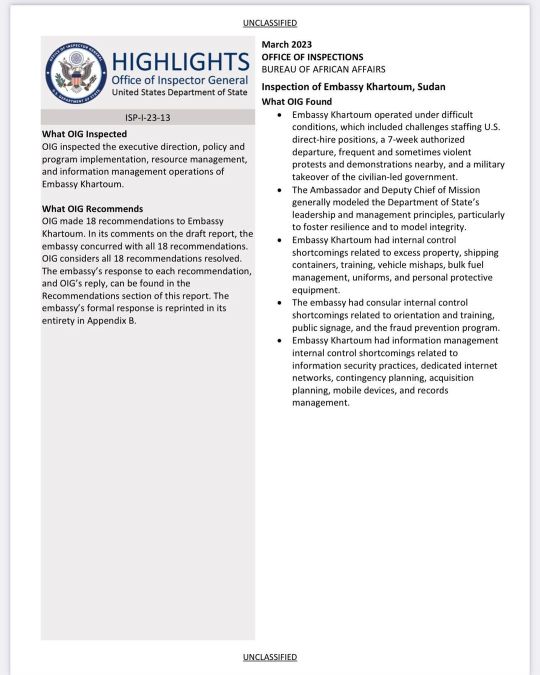
HIGHLIGHTS @statedept #OIGDOS: What OIG Inspected OIG inspected the executive direction, policy and program implementation, resource management, and information management operations of Embassy Khartoum. What OIG Recommends OIG made 18 recommendations to Embassy Khartoum. In its comments on the draft report, the embassy concurred with all 18 recommendations. OIG considers all 18 recommendations resolved. The embassy’s response to each recommendation, and OIG’s reply, can be found in the Recommendations section of this report. The embassy’s formal response is reprinted in its entirety in Appendix B. March 2023 OFFICE OF INSPECTIONS BUREAU OF AFRICAN AFFAIRS Inspection of Embassy Khartoum, Sudan What OIG Found • Embassy Khartoum operated under difficult conditions, which included challenges staffing U.S. direct-hire positions, a 7-week authorized departure, frequent and sometimes violent protests and demonstrations nearby, and a military takeover of the civilian-led government. • The Ambassador and Deputy Chief of Mission generally modeled the Department of State’s leadership and management principles, particularly to foster resilience and to model integrity. • Embassy Khartoum had internal control shortcomings related to excess property, shipping containers, training, vehicle mishaps, bulk fuel management, uniforms, and personal protective equipment. • The embassy had consular internal control shortcomings related to orientation and training, public signage, and the fraud prevention program. • Embassy Khartoum had information management internal control shortcomings related to information security practices, dedicated internet networks, contingency planning, acquisition planning, mobile devices, and records management. #csadosdexcerpt from Full report https://www.stateoig.gov/uploads/report/report_pdf_file/isp-i-23-13.pdf https://www.instagram.com/p/Cp93G9iO9oK/?igshid=NGJjMDIxMWI=
0 notes
Text
President Biden Reveals New Nominations for Key Administration Jobs
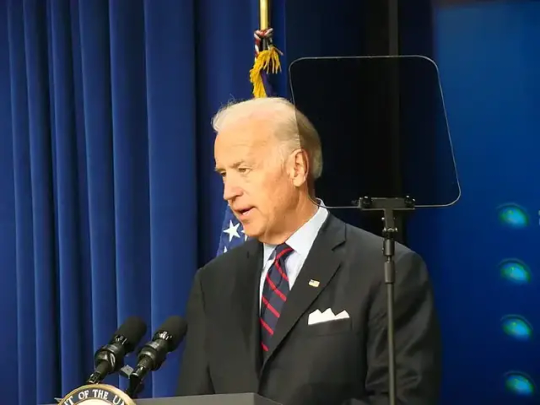
President Joe Biden has just announced his intent to nominate the following individuals to serve as key leaders in his administration:
- Vernelle Trim FitzPatrick, Nominee for Ambassador Extraordinary and Plenipotentiary to the Gabonese Republic
- William W. Popp, Nominee for Ambassador Extraordinary and Plenipotentiary to the Republic of Uganda
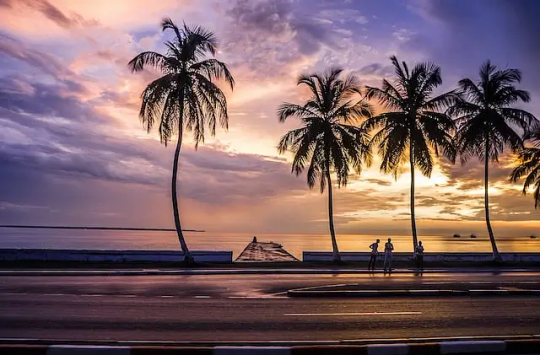
Libreville, Gabon. Photo by Ralph Messi. Unsplash.
Vernelle Trim FitzPatrick, Nominee for Ambassador Extraordinary and Plenipotentiary to the Gabonese Republic.
Vernelle Trim FitzPatrick, a career member of the Senior Foreign Service, class of Counselor, currently serves as Office Director for the Office of Assistance to Africa in the Bureau of Population, Refugees, and Migration at the U.S. Department of State in Washington, D.C.
Prior to that, FitzPatrick served as Deputy Chief of Mission of the U.S. Embassy in Yaoundé, Cameroon and before that, as Acting Deputy Director for the Office of Central African Affairs in the Bureau of African Affairs at the Department of State.
She also served as Deputy Director for the Office of West African Affairs in the Bureau of African Affairs. Earlier, FitzPatrick served as Ethiopia Desk Officer in the Office of East African Affairs and held positions as the Political Section Chief at the U.S. Embassy in Accra, Ghana and as Political Officer at U.S. Embassy Sarajevo in Bosnia and Herzegovina.
FitzPatrick earned her Bachelor’s from Davidson College, Davidson, North Carolina and her Master’s from George Washington University in Washington, D.C. Her languages include French and Spanish.
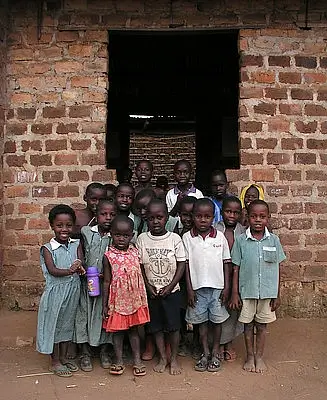
Children of Uganda. Photo by World Bank Photo Collection. Flickr.
William W. Popp, Nominee for Ambassador Extraordinary and Plenipotentiary to the Republic of Uganda.
William Popp, a career member of the Senior Foreign Service, class of Minister-Counselor, currently serves as the U.S. Ambassador to the Republic of Guatemala. Previously, Popp was the Deputy Chief of Mission and Chargé d’affaires, ad interim, from November 2018 until March 2020 of the U.S.
Embassy in Brasilia, Brazil. Before that, he served first as the Political Counselor and then as the Acting Deputy Chief of Mission of the U.S. Embassy in Nairobi, Kenya. Earlier, Popp was the Director of the Office of Regional Economic Policy and Summit Coordination in the Bureau of Western Hemisphere Affairs at the State Department.
Prior to this, he was the Deputy Principal Officer and later Acting Principal Officer at the U.S. Consulate General in Sao Paulo, Brazil. Among his other assignments, he held positions in the U.S. Embassies in Colombia, Angola, and Nicaragua.
Popp earned his Bachelor of Arts degree at Westminster College, his Master of Arts degree at George Washington University, and his Master of Science degree in National Security Strategy at the National War College. He speaks Spanish and Portuguese.
Sources: THX News & The White House.
Read the full article
0 notes
Text

Ambassador William B. Jones (May 2, 1928 - May 20, 2021) as the Ambassador to Haiti. Born to Bill and LaVelle Jones in Los Angeles.
He graduated from UCLA with an AB in Political Science with a History minor. He studied abroad on a scholarship at University College in Southampton, England. He graduated USC School of Law with a JD.
He practiced law in Los Angeles (1953-62). He joined the US Foreign Service (1962). He worked for the Bureau of Educational and Cultural Affairs as Chief of West Coast and Mali Programs. He was Deputy Director of the Office of African Programs (1964-67) and from 1967 to 1969, Director of Programs Evaluation and Analysis Staff (1967-69). He served as Deputy Assistant Secretary of the Bureau of Educational and Cultural Affairs (1969-1973).
His first overseas assignment came (1973-77) when he was stationed at the Embassy in Paris, serving as the US Permanent Representative to the UN Educational, Scientific, and Cultural Organization. He served as Ambassador to Haiti (1977-80).
He was the Diplomat in Residence at Hampton University (1980-81). He returned to the State Department within the Bureau of Intelligence and Research (1981-82). He applied his legal skills to the development of the 1982 Law of the Sea Treaty. He was the Ambassador in Residence at the University of Virginia (1983-84).
He left the Foreign Service in 1984. He went to work for Congressman George Crockett of Michigan. He was Crockett’s Staff Director with the House Foreign Affairs Subcommittee. From 1988 to 1989, Jones practiced law in DC (1988-89). He was a Visiting Fellow at the Woodrow Wilson Foundation of Princeton. He served as Ambassador in Residence and the Johns Professor of Political Science at Hampden-Sydney College (1993-2007) and as Distinguished Visiting Professor at Pepperdine University (1993-2004).
He was a member of Sigma Pi Phi Fraternity, and he was married to Joanne Jones. They have three children. #africanhistory365 #africanexcellence #sigmapiphi
0 notes